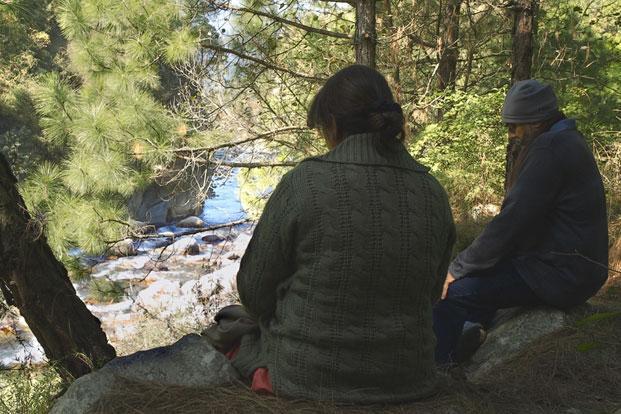By Rahul Desai
“What is your name, young man?” he asked me politely.
“I’m your grandson”.
“Oh,” he gasped, as if, for a moment, the enormity of something dawned upon him.
He caressed the photograph of an old woman on the table. His heart was broken, but he didn’t understand why. A teardrop rolled down his cheek onto the glass frame.
“Find this lady,” he whispered.
The lady was my grandmother – and this was her funeral. This man was my grandfather. They had been married for 60 years.
He was suffering from Alzheimer’s. I had familiarized myself with this disease through the iconic film adaptation of Nicolas Sparks’ ‘The Notebook’. When her old husband (James Garner) visits, Gena Rowlands’ worried blankness stayed with me. I remained under the impression that intense love stories are often immortalized with this illness.
Some years later, I was to recall my grandfather’s wide-eyed look of fractured consciousness. Lump in throat, I saw his face in that of actor Serge Houde’s as Richard Lerner in the film 50/50; Lerner, too, doesn’t recognize his cancer-afflicted son (Joseph Gordon-Levitt), but he never forgets the identity – and frightfully caring presence – of his domineering wife (Anjelica Huston). Frank Langella plays a more selfish, solo version in ‘Robot and Frank’; his condition is equally alarming for how his ex-wife (Susan Sarandon) is relegated to the memory bin. Despite Julianne Moore’s Oscar-winning turn in ‘Still Alice’, I’m yet to come across a more authentic representation of Alzheimer’s on screen – in stark contrast to, say, Mr. Bachchan’s theatrical haze in ‘Black’ or Supriya Pathak’s haplessness in ‘All Is Well’.
More importantly, my grandfather’s momentary lapse had allowed me to recognize the purest, most unfiltered form of longing. I hadn’t cried then. Maybe I thought my grief was too young, too inconsequential.
Nine years later, as I sank further into my seat during a morning show at the Mumbai Film Festival, I broke down. I shed tears that belonged to that morning. The culprit was playwright Pushan Kripalani’s first feature film, ‘The Threshold’.
The moment in question was singular: A hard-nosed North Indian husband (Rajit Kapoor) bursts into tears, desperately clinging onto his wife (Neena Gupta). He grabs her waist, like a child would his mother on the first day of school.
She is leaving him after 30 years of marriage. By now, it doesn’t matter why.
For the preceding five long minutes, he helps her pack a bulging suitcase. She silently watches him wrestle with it. This is his way of being more attentive – and also of proving that she may need him – until it dawns upon him that he is merely writing his own eulogy.
Throughout the 80-odd minutes of this chamber drama, dependence is his ally. Like my grandfather, he couldn’t cook his own meals. Or perhaps, he chooses not to learn. To sustain their companionship, he chooses not to be self-sufficient. Perhaps he knows that it is the only way his wife would care for him. Before she leaves, he offers to make her an omelet. She winces when he uses too much oil, and aches to tell him the location of its ingredients. Soon, like the omelet, she is in pieces. His tryst with loneliness will begin from the kitchen. One can only imagine him sitting aimlessly in his chair the next morning. He has nobody to patronize, and nobody to ignore.
Perhaps that’s why my grandfather, too, waited for the lady outside the kitchen. He had packed her bags. He wanted to go back home – he didn’t know where – with her. But she never came out.
Irrespective of age, one often associates maturity – or at least the concept of it – with parents and grandparents. For long, they do grown-up things like pay bills, run businesses and raise children. But there’s something about watching them become vulnerable and wither away. I’m not talking Shahrukh in ‘Veer Zara’, rather his parents Amitabh-Hema in the same film. What becomes of them? What becomes of Kamal Kishore Khosla after his son Cherry moves out, or of Do Dooni Char’s Santosh Duggal when his missus passes before he does? Do they all turn into Warren Schmidt (Jack Nicholson) in ‘About Schmidt’, Frank Goode (de Niro) in ‘Everybody’s Fine’, or Rocky Balboa (Stallone) in ‘Creed’, or closer to home, Bauji (Sanjay Mishra) in ‘Aankhon Dekhi’?
When they embrace weakness and hurt so visibly, it’s both unnerving and cathartic. Pain, we discover, is not entirely a young feeling. Love, we discover, has always been an old potion. And, in a way, their tears put us on the threshold of adulthood.






Leave A Comment
You must be logged in to post a comment.